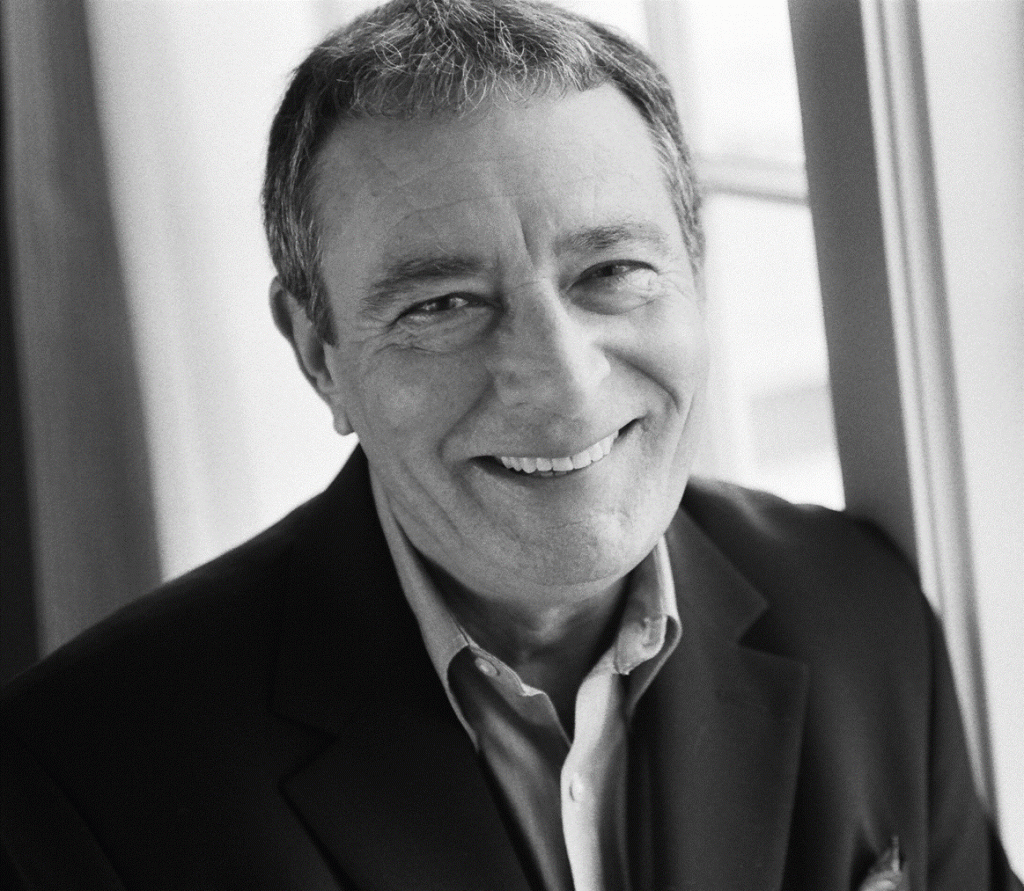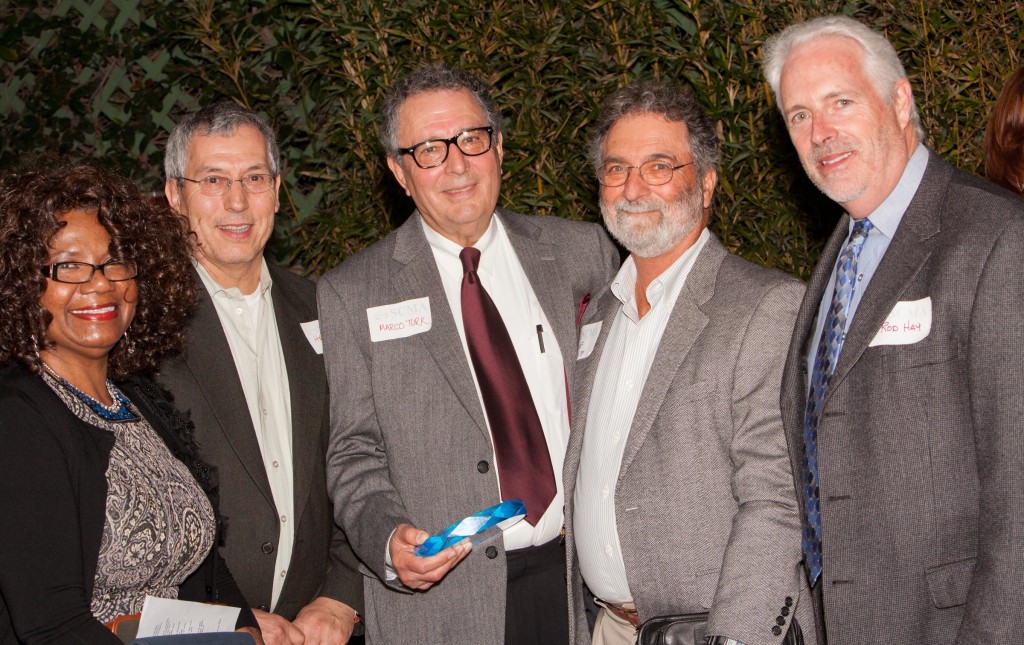
For perhaps the greatest legacy of his career–redesigning the Negotiation, Conflict Resolution and Peacebuilding (NCRP) as stand-alone undergraduate and master’s degree programs at California State University, Dominguez Hills–Avrum Marco Turk was honored with the Southern California Mediation Association’s (SCMA) 2013 L. Randolph Lowry Award. The award was presented in November during a reception preceding the 25th Annual SCMA Fall Conference held at Pepperdine University School of Law in Malibu, where he served as a panel moderator discussing mediation approaches.
Turk, former director and now professor emeritus of NCRP at CSU Dominguez Hills, said the recognition came as a surprise but that he was honored to receive the award.
“It’s probably the most significant award I’ve received of that type in my career,” he noted.
Named after L. Randolph Lowry, the co-founder of the SCMA, founding director of the Straus Institute for Dispute Resolution at Pepperdine Law School, and the current president of Lipscomb University in Nashville, Tennessee, the award is presented annually by the SCMA to a member of the dispute resolution community who has inspired others through their “passion and dedication to education in the field of dispute resolution.”
A member of the State Bar of California since 1961, with experience in appellate, entertainment, legal malpractice, and real estate, among other areas, Turk’s interest in mediation and higher education came after years of practicing family law.
“I realized that [many of] these cases really shouldn’t be going to court and mediation was starting to become the thing,” he recalled.
With that in mind, he earned a certification in community mediation in 1991. His work since has drawn international recognition and in March, at the University of California, Irvine, he will deliver the keynote address, “A Mediated Approach to Restorative Justice: Transformation of People, Relationships and Communities,” to commence the 2014 Orange County Mediation Week.
Although he had been teaching dispute resolution since 1963 as an adjunct professor at the Southwestern University School of Law (now Southwestern Law School) in Los Angeles, where he received his Juris Doctor cum laude degree in 1960, by 1993 Turk was ready to shift his focus from practicing law to full-time education.
That year Turk closed his private law practice in West Los Angeles and two years later, in 1995, had stopped practicing law altogether, taking on his first full-time position as a student-faculty recommended instructor in the Department of Criminology, Law, and Society (CLS) at UCI, and later in its Global Peace and Conflict Studies Program. He went on to co-establish that university’s groundbreaking online Master of Advanced Study degree in CLS, the first such program in the UC system.

Concentrating on higher education seemed to be the right decision for Turk.
“I just like teaching and I found that the UCI students really responded to me, and it was [rewarding] to be able to bring the real world into the classroom,” he said, adding that undergraduates have their own appeal and are “bright-eyed and bushy-tailed and they just want to learn and they want to know.”
Turk joined the faculty at CSU Dominguez in 2002 as director of the Behavioral Science graduate program, and coordinator of its negotiation and conflict management (NCM) option, which had been established as an option under that program as well as a certificate program in 1987. Under Selase Williams, then the dean of the College of Arts and Sciences (now the College of Arts and Humanities), and Cecile Lindsay, then the associate vice president of academic affairs and dean of graduate studies and research, Turk was tasked with spearheading the rejuvenation of the behavioral science graduate program.
Since his arrival at the university he continued to revise and expand the NCM option, creating a new curriculum, and ultimately, in 2006, giving it the NCRP name and making it a stand-alone major at both the undergraduate and master’s levels, as well as establishing a post-master’s certificate in conflict analysis and resolution, designed to enable Ph.D. holders to acquire a specialization.
The NCRP program at CSU Dominguez Hills is reportedly the largest and second-oldest master’s degree program in conflict management/resolution (and now peacebuilding) in the world and the first, along with Nova Southeastern University in Fort Lauderdale, Fla., and still one of only two institutions to offer the graduate degree both in a traditional residency and by an online interactive Internet program, according to Turk.
Turk made such progress early on that he was named the first recipient of the A. M. Turk Values Award, which was created in his honor in 2003 by the CSU Dominguez Hills NCM Alumni Association (now known as the NCRP Affinity Association.)
A first-generation college student himself, Turk is driven to provide CSU Dominguez Hills students with a quality education and the opportunity to keep their schooling as cost effective as possible and to have a competitive advantage when entering the job market.
To accomplish this, Turk developed and, in fall 2007, launched an accelerated cross-institution, multiple-degree program. Partnering with Southwestern Law School, the program allows CSU Dominguez Hills students to defer and fulfill their undergraduate electives with first-year law courses taken at Southwestern, enabling them to complete a bachelor’s and law degree in six years rather than the traditional seven. Unique among the 23-campus CSU system (until CSU Northridge adopted a similar program with plans to enroll its first participants in fall 2014) the “3+3” program additionally provides the opportunity for Toros who hold a bachelor’s degree from the program to continue in the NCRP master’s program during their final years at Southwestern. Students who participate in both components of the program are able to earn three degrees–a bachelor’s, masters, and Juris Doctor–in six years instead of nine.
Turk has made an impact well beyond the classroom, too. An internationally recognized educator, mediator, and peacebuilder specializing in ethnic conflict, Turk spent two years as a Fulbright Senior Scholar in 1997 working on conflict resolution on the Eastern Mediterranean Island of Cyprus.
“In my discipline of law, and my specialty of conflict resolution, there was only one place to go and that was Cyprus,” he said, adding that as the basis for his Fulbright award he utilized the family peace makers program he co-designed, in collaboration with a UCI research psychologist, to deal with cases of domestic violence in Cyprus.
Initially one of the early American Fulbright Senior Scholars to be assigned to this region, Turk made several funded return trips between 2000 and 2008 to continue peacebuilding work with both Greek and Turkish Cypriots, and has been recommended by the Council for International Exchange of Scholars for a five-month Fulbright teaching award in Cyprus in fall 2014 and spring 2015 at the University of Nicosia’s Mediterranean Institute for Gender Studies, focusing on women and peacebuilding. (His potential future award is pending final approval by the Commission for Educational Exchange between the U.S. and Cyprus, the U.S. Department of State, and the J. William Fulbright Foreign Scholarship Board.)
Turk has developed a keen understanding of the complex political and social frameworks of Cypriots, and has authored the book “Visions in Conflict, Peacebuilding in Cyprus: A View from the Ground,” Vol. II in a series, (Brian C. Alston, 2013). A sought after mediation expert, in 2003 he was one of only two Americans invited to attend Oxford University’s international workshop that focused on unifying Cyprus. On another occasion, he trained mediators in Istanbul, Turkey, focusing on mediator ethics. He has also conducted mediation training programs in Israel and Norway.
Turk has approached each phase of his professional life with the same determination.
“I must’ve had five different careers. If I see something and I like it–I mean I can’t be a rocket scientist, obviously, but most everything else that I see–if I put my nose to grind stone, I can do it,” he quipped. “The education part, full-time starting in 1995, is the longest period of time that I’ve done anything in my professional career.”
In addition to being an educator, international mediator, and private practice lawyer, Turk has worked as a Los Angeles Superior Court judge pro tem, arbitrator for the American Arbitration Association, judicial attorney for a judge and court of appeal justice, talent agent at the entertainment industry’s famed William Morris Agency, law partner in charge of the entertainment law department at a major Beverly Hills law firm, Ervin, Cohen and Jessup, as well as creating, developing and producing television movies.
And, at 78, he’s not yet done with taking on new challenges. The Hollywood native who lives in Santa Monica by way of Bremerton and Seattle, Washington, is currently developing a contemporary 90-minute one-act play about a psychotherapist who is forced to confront her demons when she agrees to treat a patient dealing with his tortured past.
As for his own past, he sees his role in education as particularly meaningful.
“I had a student who would never talk in class. By the time she finished my classes, she was talking in class. She went on to law school, now she’s practicing [law] in San Francisco. How do you replace those kinds of things? You can’t put a dollar value on them,” Turk remarked. “I think I’ve made a difference in some people’s lives. And that’s the thing about education that I really enjoy.”
For more information on the university’s NCRP program, visit cah.csudh.edu/ncrp.